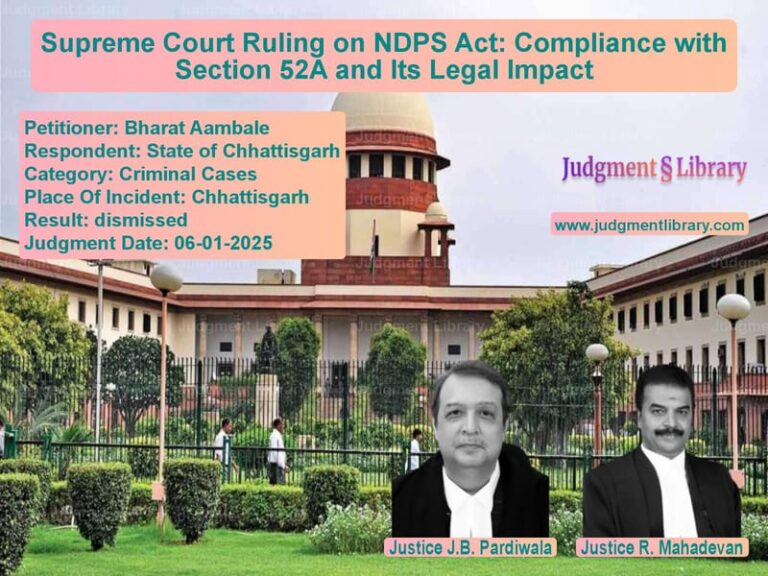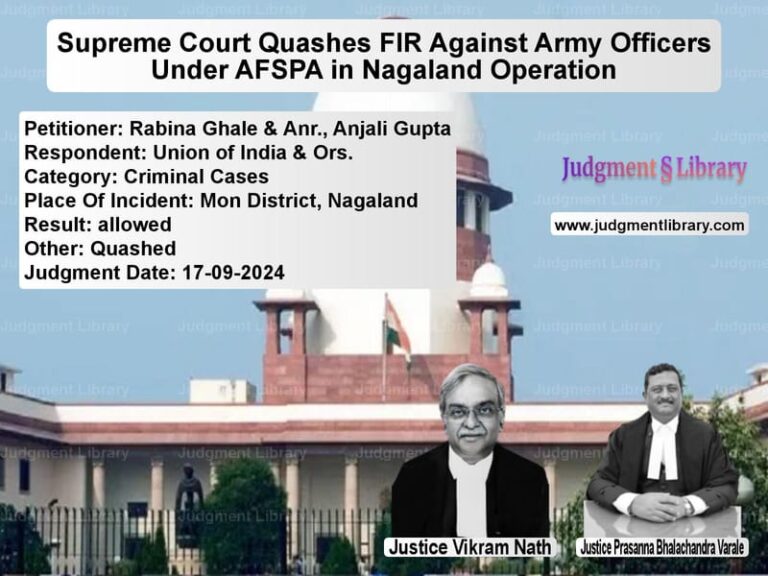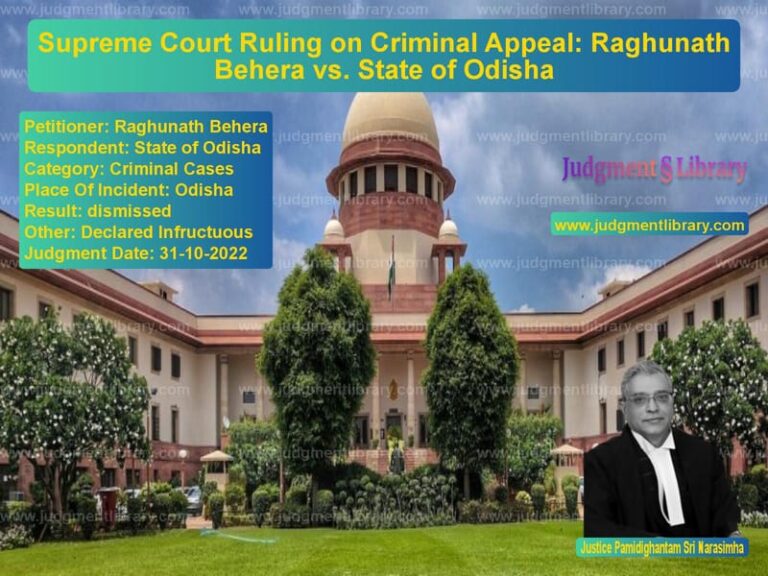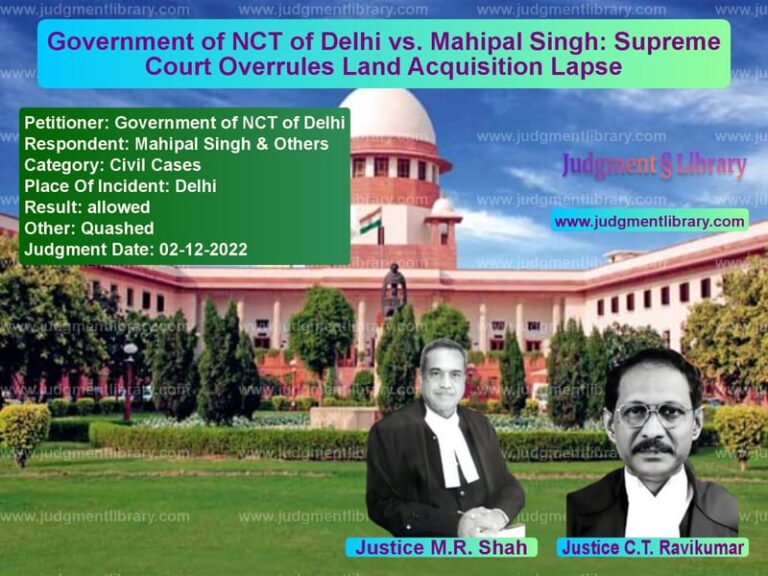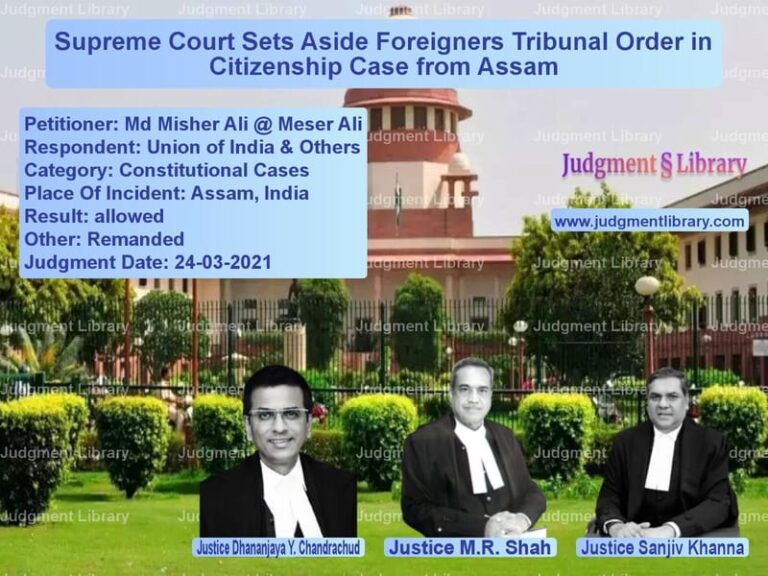Supreme Court Upholds Demolition of Dilapidated Building in Mumbai Despite Tenants’ Objections
The Supreme Court has dismissed an appeal against the demolition of an old and structurally unsafe residential building in Mumbai, rejecting claims by the tenants that their rights were being violated. The judgment reaffirms the authority of municipal bodies to enforce safety measures under the Mumbai Municipal Corporation Act, 1888, while ensuring that affected residents are provided alternative housing.
Background of the Case
The dispute arose over Flat No. 9 in Vasudha Co-operative Housing Society, Chembur, Mumbai. The late Shri Ratilal S. Pujara, the original owner, had executed a will in favor of the appellants, who were declared legal heirs in 2014. The building was constructed in 1967 and had completed over 55 years of existence, requiring a structural audit under the Mumbai Municipal Corporation (MMC) Act.
A structural audit conducted on July 22, 2014, classified the building as C-1 (most dangerous). Subsequent inspections in December 2014 confirmed that the building was in a dangerous and dilapidated condition. The society entered into a redevelopment agreement with Harita Developers, and on January 19, 2015, the Mumbai Municipal Corporation issued a demolition notice under Section 354 of the MMC Act, followed by an eviction notice on February 21, 2015.
The appellants challenged the notices before the Bombay High Court, which dismissed their petition, finding that the building was unfit for habitation. They then approached the Supreme Court.
Arguments Before the Supreme Court
Petitioners’ Arguments (Residents of Flat No. 9)
- The appellants contended that their flat was wrongly classified as unauthorized and that demolition would destroy evidence necessary for a pending civil dispute regarding the regularization of their terrace.
- They argued that the demolition order violated a status quo order issued by the High Court in a separate civil appeal related to the regularization of alterations made to their flat.
- They claimed that the Mumbai Municipal Corporation’s actions amounted to contempt of the High Court’s stay orders.
Respondents’ Arguments (Municipal Corporation and Developers)
- The Mumbai Municipal Corporation argued that the building was classified as C-1, meaning it was unsafe and unfit for human habitation.
- They emphasized that all other residents had vacated the building and agreed to redevelopment.
- The developers and society contended that the appellants’ dispute over the terrace regularization was separate from the issue of structural stability.
Supreme Court’s Observations
The Supreme Court analyzed the structural audit reports, noting that the building was beyond repair and posed a significant risk. The Court observed:
“The safety of residents and the public at large cannot be compromised due to individual grievances. Judicial intervention should not hinder municipal authorities from carrying out their statutory duties.”
The Court further stated:
“There is no justification for allowing an unsafe structure to remain standing, especially when the rights of the appellants in the redeveloped building are fully protected.”
Supreme Court’s Verdict
Based on the structural reports and legal provisions, the Supreme Court ruled:
- The demolition of the building shall proceed as per the notices issued by the Mumbai Municipal Corporation.
- The appellants’ claim regarding the regularization of the terrace is separate from the demolition issue and does not warrant interference.
- The redevelopment agreement ensures that all residents, including the appellants, will be allotted a new flat with additional compensation.
- The appellants will receive displacement compensation of ₹40,000 per month until the redevelopment is completed.
Impact of the Judgment
This ruling has significant implications for urban planning and municipal governance:
- It reinforces the authority of municipal bodies to take action against unsafe buildings.
- It ensures that tenants and property owners receive due compensation and alternative housing in redevelopment projects.
- It prevents delays in redevelopment projects due to isolated legal disputes.
The judgment underscores the importance of public safety over individual objections, setting a precedent for similar cases in Mumbai and other urban areas.
Petitioner Name: Ratilal S. Pujara (Since Deceased) Through Legal Representatives.Respondent Name: Municipal Commissioner, Municipal Corporation of Greater Mumbai & Ors..Judgment By: Justice Krishna Murari, Justice Hima Kohli.Place Of Incident: Chembur, Mumbai.Judgment Date: 25-08-2022.
Don’t miss out on the full details! Download the complete judgment in PDF format below and gain valuable insights instantly!
Download Judgment: ratilal-s.-pujara-(s-vs-municipal-commission-supreme-court-of-india-judgment-dated-25-08-2022.pdf
Directly Download Judgment: Directly download this Judgment
See all petitions in Property Disputes
See all petitions in Landlord-Tenant Disputes
See all petitions in Judgment by Krishna Murari
See all petitions in Judgment by Hima Kohli
See all petitions in dismissed
See all petitions in supreme court of India judgments August 2022
See all petitions in 2022 judgments
See all posts in Civil Cases Category
See all allowed petitions in Civil Cases Category
See all Dismissed petitions in Civil Cases Category
See all partially allowed petitions in Civil Cases Category


